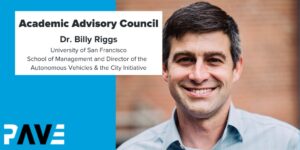About
William (Billy) Riggs, Ph.D., AICP, LEED AP is a professor at the University of San Francisco School of Management, and director of the Autonomous Vehicles & the City Initiative. His work on automated and autonomous mobility focuses on business and technical operations, travel behavior and urban planning / policy. Dr. Riggs has authored over 100 publications with expertise ranging beyond automated mobility and urban technology, to economics, infrastructure finance, urban development and housing. He is the author of End of the Road: Reimagining the Street as the Heart of the City (2022).
PAVE: How does your work align with our mission to educate the public on AV technology and its promise?
My work focuses on AV vehicle operations into existing transportation systems from a technical as well as operational standpoint — particularly with an interest on the promise of improved safety but also in the possibility to serve those who have long been under-resourced and under-served as a part of our existing transportation / transit systems. A lot of this work centers around public education as a part of the University of San Francisco’s Autonomous Vehicles and the City Initiative and symposium.
The initiative and symposium focus on advancing a cross-sector (public and private) efforts to educate cities on the opportunities AVs present for new and revolutionary non-binary (does always have to be a shuttle or a bus or a robotaxi) transport / transit systems that are complimentary with current networks but also extend them to provide new forms of service in locations that cities have never been able to properly serve. I also work with communities to educate them about things like sensor fusion, the minor amount of localization needed given advances in generative AI and how technology like blockchain can be used to make targeted neighborhood improvements that could be supportive of AV operations. In sum, I spend most of my time talking with the public about an AV future that is more sustainable and fiscally solvent—where AVs will integrate with sustainable urban planning and development across a variety of built environment contexts — from large cities to small towns.
PAVE: What are the current barriers you see in public acceptance of automated vehicles?
Right now one of the biggest barriers to acceptance of AVs is a lack of public awareness and understanding about the technology. To some degree this is a product of industry scale since there are very few Level 4 (L4) deployments out there. That said we also face a fragmented policy landscape that limits innovation in manufacturing and advances in a durable supply chain with OEM production of future-leaning, highly automated vehicles. Two of the biggest things we can do to address these issues is to help facilitate more L4 deployments that norm that public to this technology, and to explore partnerships and integrations with existing transport / transit systems. This can help us work toward the safety benefits of automated driving while advancing commitments to sustainability and social justice.
About the Academic Advisory Council: PAVE’s academic partners help to guide PAVE on its mission of promoting fact-based public discussion about automated vehicles. Council members serve in a strictly advisory capacity, providing PAVE and its members with opinions and recommendations related to AV technology and its societal effects.
 PAVE US
PAVE US PAVE EUROPE
PAVE EUROPE PAVE UK
PAVE UK

